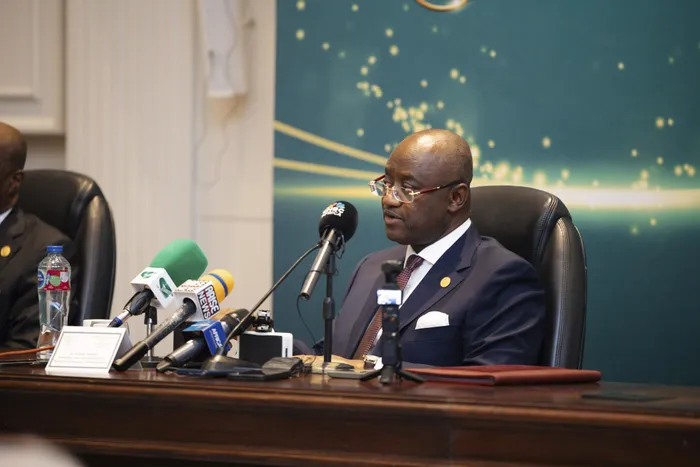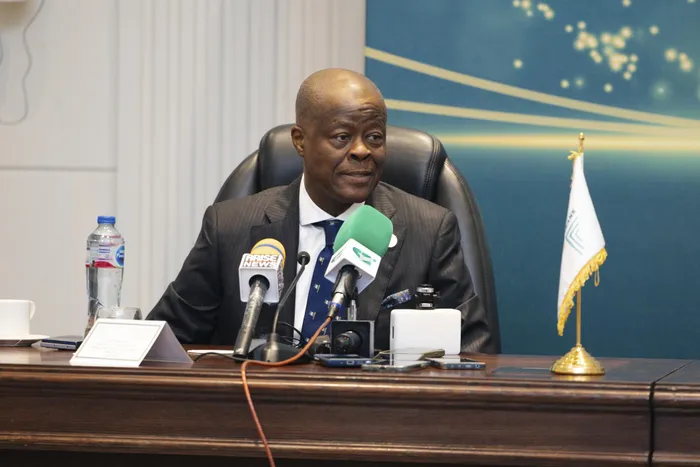Afreximbank President calls for investment in job-creating sectors across the continent

Newly elected President of the African Export-Import Bank (Afreximbank), Dr George Elombi, speaking during a closing media briefing at the end of the Farewell Conference and Investiture Ceremony on Saturday.
Image: Supplied
The newly elected President of the African Export-Import Bank (Afreximbank), Dr George Elombi, has urged African nations to direct scarce resources toward sectors that can create sustainable employment and wealth, warning that continued investment in non-labour-intensive industries would entrench the continent’s unemployment crisis.
Speaking at the end of the Farewell Conference and Investiture Ceremony on Saturday in Egypt’s new administrative capital, Elombi said that the continent faces a paradox of high unemployment despite abundant opportunities in industries that could absorb labour.
“Africa has a huge level of unemployment, but at the same time, we have sectors that can easily create jobs,” Elombi said. “Unfortunately, much of the encouragement we receive—often from abroad—is to invest in sectors that do not create employment. If we want to change our situation, we must move into those sectors that generate work and wealth.”
Elombi emphasized that Africa’s limited financial resources should be channelled toward industries with high employment potential, such as agriculture, agro-processing, mineral beneficiation, and manufacturing.
“For the little resources we have, let’s invest in those areas that create wealth. The additional wealth generated will allow governments to expand their tax base, increase revenues, and strengthen public finances without raising tax rates,” he said.
Elombi noted that investment in infrastructure and value-added processing would multiply benefits across the economy, from job creation to technological skills development.
“When you build processing zones or industrial parks, you create thousands of jobs, stimulate supply chains, and build resilience,” he said. “For example, developing agriculture in a region should go hand in hand with investing in its supply chain and processing industries to capture more value locally.”
During the question-and-answer session, delegates pressed the President for details on which sectors were most critical for Africa’s industrialization agenda.
“As soon as you neglect processing, you lose out. Whether it’s in mining, agriculture, or tourism, value addition is where real economic transformation occurs.”
This comes as the Afreximbank is finalising the ratification process that will officially make South Africa a sovereign shareholder in the multilateral development finance institution — a move expected to unlock a significant increase in infrastructure investment and financial support for the country.
The absence of sovereign membership has until now limited the ability to provide large-scale support for South African projects by the Cairo-headquartered multilateral lender, which currently holds assets worth about $43 billion.
The move also aligns with Pretoria’s ambition to deepen its participation in the African Continental Free Trade Area (AfCFTA) and strengthen regional trade integration.
Afreximbank has signed a Memorandum of Understanding (MoU) with the Department of Public Works and Infrastructure (DPWI) and has committed more than R90 million on project preparation — including feasibility studies, business plans, and environmental permits — to ensure that major infrastructure projects are bankable.
Deputy Minister Sihle Zikalala said that Afreximbank’s involvement would help “alleviate fiscal pressure” on the government at a time when the national budget remains constrained.
“Partnering with institutions like Afreximbank and the African Development Bank gives us more funding options to drive infrastructure development,” he said.
According to Zikalala, Afreximbank’s focus on supporting manufacturing, innovation, and intra-African trade aligns perfectly with South Africa’s industrial transformation goals.
“The Bank is big on supporting entrepreneurs in the manufacturing sector, ensuring they receive export finance and market access,” he said. “Their emphasis on shifting Africa’s economy from exporting raw materials to exporting finished goods is exactly the kind of transformation we need.”

Wale Edun, chairman of the general meeting and Nigeria’s Minister of Finance, praised Afreximbank’s record of leadership transitions and institutional transformation.
Image: Supplied
Meanwhile, the session on Saturday also featured Wale Edun, chairman of the general meeting and Nigeria’s Minister of Finance, who praised Afreximbank’s record of leadership transitions and institutional transformation.
“The Bank has gone through three successful leadership transitions and continues to deliver impactful transformation across the continent,” Edun said. “Under the new leadership, we expect even stronger alignment with Africa’s development priorities.”
In response, Elombi reaffirmed his commitment to maintaining the Bank’s stability and neutrality, especially amid global economic uncertainty.
“Our focus remains on supporting Africa’s growth without bias, driven by sound economics and regional cooperation,” he said.
“If we invest wisely, we can create a continent where our young people have work, our governments have revenue, and our economies create wealth for generations to come.”
BUSINESS REPORT